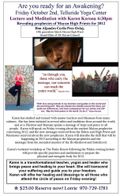Telluride Yoga Center welcomes Tim Miller
 This weekend, the Telluride Yoga Center welcomes yoga instructor Tim Miller to town for a weekend immersion in his lineage, Ashtanga Yoga, including pranayama or controlled breathing techniques, and kirtan, group chanting.
This weekend, the Telluride Yoga Center welcomes yoga instructor Tim Miller to town for a weekend immersion in his lineage, Ashtanga Yoga, including pranayama or controlled breathing techniques, and kirtan, group chanting.Tim Miller is first among equals. His studio in Encinitas holds the distinction of being the birthplace in America of Ashtanga Yoga.
The practice of Ashtanga Yoga is an ancient and powerful discipline for cultivating physical, mental and spiritual health. Progressive techniques of breath, posture and movement, cleanse, stretch and strengthen the body as well as focus and calm the mind. A steady, focused practice holds the potential for profound personal transformation.







